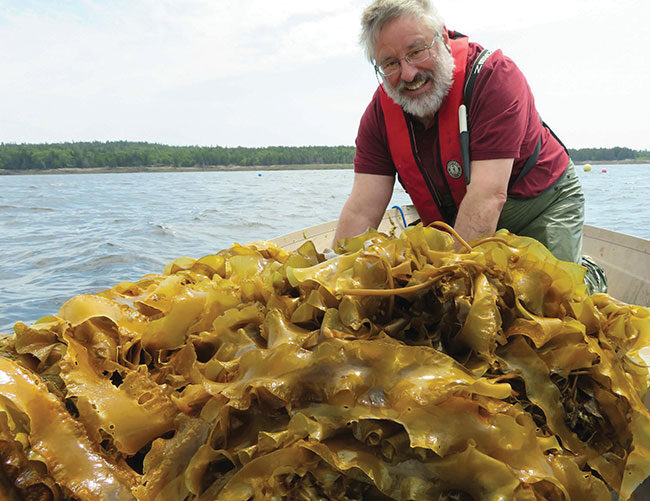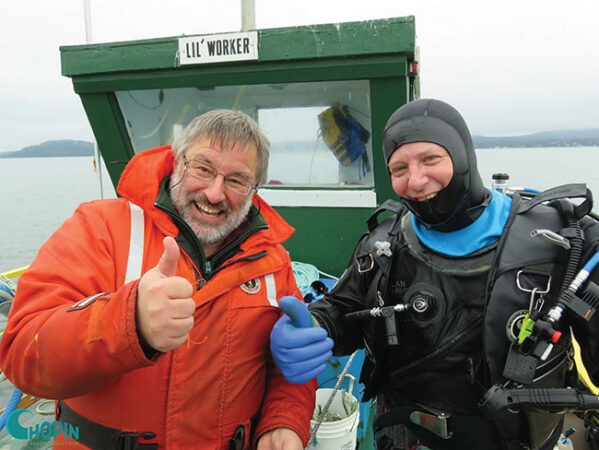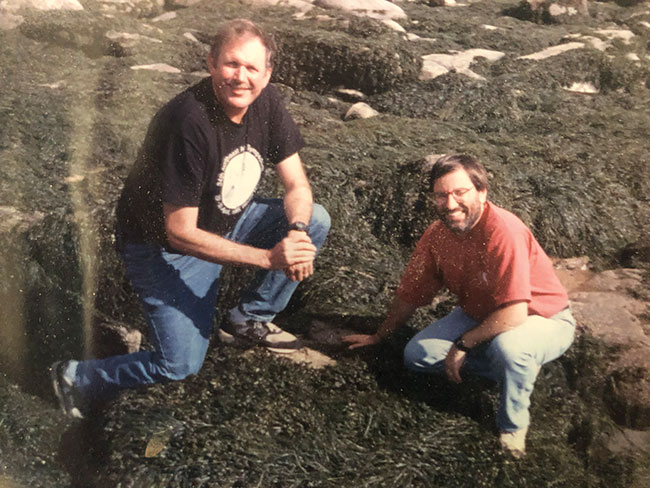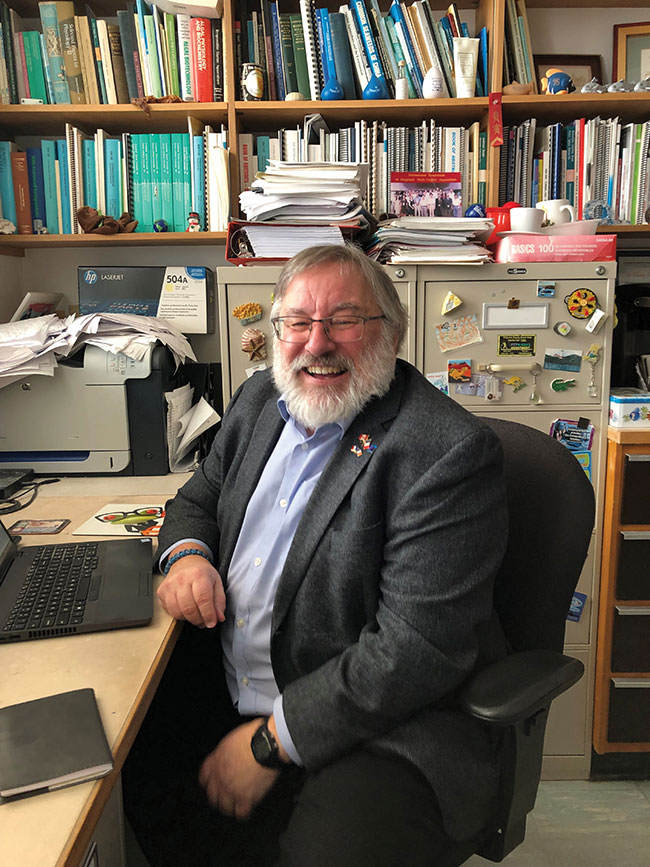
Features
Thierry Chopin: Father of IMTA
Remembering Thierry Chopin, an IMTA advocate and aquaculture champion
October 25, 2024 By Bonnie Waycott
 Thierry Chopin is often recognized for his work in developing further research around Integrated Multi-Trophic Aquaculture (IMTA) systems.
(Photo: Steve Backman/Turquoise Revolution)
Thierry Chopin is often recognized for his work in developing further research around Integrated Multi-Trophic Aquaculture (IMTA) systems.
(Photo: Steve Backman/Turquoise Revolution) The world of aquaculture recently honoured a tireless advocate of seaweed culture and his life’s work.
Thierry Chopin, professor of Marine Biology at the University of New Brunswick in Canada and a tireless advocate of seaweed aquaculture, passed away on July 18, 2024 on Prince Edward Island in Canada. He was 65.
Born and educated in France, Chopin was a seaweed ecophysiologist and biochemist in Brittany, northwestern France. His love for the sea started at an early age, when vacationing with his family along the French coast and sailing the waters there instilled his love of the Atlantic ocean. In 1989, he moved to Canada. A career in marine biology began, with a focus on the ecophysiology, biochemistry and cultivation of commercial value seaweeds, and the development of Integrated Multi-Trophic Aquaculture (IMTA) systems to promote environmental sustainability, economic stability, and societal acceptability of aquatic farming. Chopin was also the director of the Seaweed and Integrated Multi-Trophic Aquaculture (IMTA) Research Laboratory, and past president of the Aquaculture Association of Canada (AAC), the Phycological Society of America, and the International Seaweed Association.
Chopin and his work were also recognised with numerous awards. Since 2001, Chopin was an Honorary Consul of France, and was awarded the title of Chevalier/Knight in the Ordre des Palmes Académiques. He was also a Knight in the Ordre National du Mérite Maritime. In 2016, he created his own consultancy, Chopin Coastal Health Solutions Inc., and the following year created the Thierry Chopin Award for Graduate Coastal Studies, which is given annually to a promising graduate student at the Saint John campus of the University of New Brunswick (UNBSJ) in the areas of phycology, marine and freshwater IMTA, and coastal biology.
Other accolades include the NSERC Synergy Award for Innovation, the Aquaculture Association of Canada Research Award of Excellence, and the New Brunswick BioSciences Achievement Award. Chopin’s dedication has also been recognized with prestigious honors, such as being named a Knight in the Ordre National du Mérite and receiving the Queen Elizabeth II Platinum Jubilee Medal.
“It’s impossible to capture Thierry’s essence with mere words,” said Steven Backman of Magellan Aqua Farms Inc., in St. Stephen, Canada. “Destiny brought together this world-renowned phycologist and myself, a veterinary fish pathologist. We seemed to have little in common except for a shared passion in advancing sustainable aquaculture in Canada.”

Thierry Chopin and Steve Backman harvesting seaweed at Magellan Aqua Farms Inc. in St. Stephen, New Brunswick, Canada. (Photo: Steve Backman/Turquoise Revolution)
This professional connection quickly evolved into a deep friendship and successful partnership, leading to the creation of Turquoise Revolution Inc., a project between Chopin Coastal Health Solutions Inc., and Magellan Aqua Farms Inc., to produce giant scallops and sugar kelp using off-bottom culture methods.
Barry Antonio Costa-Pierce of Ecological Aquaculture International, LLC, an international research, development and consulting firm in Maine and Portugal, first met Chopin at AAC meetings in the mid-1990s. By 2000, the two had become good friends and close colleagues, working along the same lines with different views and pathways toward the same goals.
“For over 30 years, we were brothers to the science and those practical applications in the industry that have led to the expansion of environmentally responsible aquaculture worldwide, in differing climates, water chemistries, salinities, and species,” said Costa-Pierce. “Because of our similar but different backgrounds as “working class disruptors” – Thierry, a Brittany/French immigrant to Canada, and me an Azorean/Portuguese to southeastern Massachusetts, USA – we shared much more than science. We had a mutual love of diverse cultures, and their wonderful and strange seafoods, music, and, of course, wines.”
“We argued about the best way forward toward more sustainable aquaculture and its definitions,” continued Costa-Pierce. “Were we doing integrated aquaculture, polyculture or ecological aquaculture? Or IMTA, this new moniker he pioneered? IMTA won out as a defining area of global importance, not only due to the outstanding science he led, but also due to the world’s love of Thierry as a wonderful, generous, and kind person who always gave people their say and who then engaged in his uniquely interminable manner. I’m glad IMTA will always be with us, as it will forever be aligned with Thierry and his legacy.”

Charles Yarish, professor emeritus at the Department of Ecology & Evolutionary Biology at University of Connecticut, with Thierry Chopin.
(Photo courtesy: Barry Antonio Costa-Pierce)
IMTA pioneer
Chopin was most celebrated for developing and trademarking the concept of IMTA. He defined it as the cultivation of species at two or more different trophic levels, based on their complementary ecosystem functions, such as fed species (e.g. finfish), particulate organic nutrient extractive species (e.g. shellfish and other invertebrates, herbivorous fish) and dissolved inorganic nutrient extractive species (e.g. macro- and micro-algae and plants).
Chopin believed that IMTA held great benefits. What was previously considered the byproducts of one species could be used as feed or energy by other species, he said. IMTA also provides economic diversification in an efficient and responsible food production system.
“His presentations were famously capped with a unique IMTA dance to the tune of the Village People’s ‘YMCA,’” said Backman. “Inspired by this, I’ve penned a few playful lyrics that I hope capture the spirit of Thierry’s contributions:
“Young man, there’s no need to feel low,
I said, young man, it’s Nature’s you know,
I said, young man, it’s a sustainable goal,
There’s a need to be greener.
Young girl, there’s a way you can go,
I said, young girl, now that you’re in
the know,
You can feed more, and I’m sure you
will find,
Many ways to green your sea farm.
It’s fun to practice IMTA,
It’s fun to practice IMTA.”
Chopin was also one of the masterminds behind the Canadian Integrated Multitrophic Aquaculture Network (CIMTAN) in 2009-2017. His work in developing and managing the network was a testament to his creative insights into interdisciplinary research, and his foresight and energy in bringing R&D with numerous industry partners such as Cooke Aquaculture, said Prof. Richard Moccia at the University of Guelph in Ontario. He describes Thierry as a forward thinker who has worked tirelessly over his entire career to bring knowledge and critical thinking to the discussion table.
“He built bridges provincially, nationally and internationally between the academic, public and private sectors, something that few individuals are capable of doing well,” said Moccia.
“I greatly admired his ability to combine research, teaching and extension outreach together and bring more holistic messaging about aquaculture to a broader social community. This is extremely important, as the sector needs pragmatic and credible information to help maintain its ‘social licence’ to farm seafood in Canada. Thierry worked hard to be seen as a balanced, thoughtful spokesperson for the sector.”

Thierry Chopin pictured at his office at University of New Brunswick. He worked as professor of marine biology and scientific director of CIMTAN for more than 35 years.
(Photo: Barry Antonio Costa-Pierce)
Academia and beyond
Chopin was deeply committed to his students, striving to make learning a dynamic, meaningful experience, remembered Backman. He believed in fostering critical thinking and understanding, rather than rote memorization. His commitment to education is further reflected in the scholarship fund he established at UNBSJ, a lasting tribute to his dedication and a way to support future generations.
Caroline Longtin, a former post-doctoral fellow in Chopin’s lab, admired his knowledge and strong passion for seaweed biology and aquaculture.
“I first met Thierry in 2010 when he was an examiner on my comprehensive examination committee for my PhD,” she said. “He had brilliant ideas for how seaweeds could be used to make the world a greener, more sustainable place. I spent just over two years as a member of his lab, where he gave me the freedom to explore my interests and taught me about seaweed aquaculture. Now, with a career at Fisheries and Oceans Canada, I am grateful for Thierry’s knowledge and mentorship.”
“One of my favorite memories of Thierry captures his essence perfectly,” said Backman. “In a photo from one of his class lectures, he is seen with a beaming smile, passionately discussing kelp chocolate with his students, always encouraging them to think outside the box. His enthusiasm wasn’t confined to academia; he was also a pillar in his community, supporting local causes, preserving Acadian heritage, and championing the arts through the Imperial Theatre.”
Chopin’s love for fine food and cooking, and his past membership in the Bailliage of New Brunswick of La Chaine des Rotisseurs, were reflections of his zest for life, said Backman. “In our business, he was equally dedicated, eagerly promoting the benefits of seaweeds and ready to get hands-on, whether rolling up his sleeves, seeding the lines or donning slickers and getting down and kelpy.”
As a friend, Chopin was a compassionate and empathetic listener, said Backman, always offering honest advice. But above all, his greatest pride and joy were his family. Chopin’s love for his soulmate Kathy, with whom he shared unforgettable moments like an underwater adventure in a deep submersible, and his daughters Marine and Morgan, along with his new grandson Calvin Edward Henri, brought him immense happiness. “Just the mention of Calvin’s name could light up Thierry’s face,” said Backman.
Chopin’s legacy is one of profound impact and inspiration, he added.
“Through our collaboration, I discovered Thierry to be a remarkable individual,” he said. “He was driven by passion and creativity, using his impressive array of skills to tackle complex challenges with scientific rigor and innovative thinking. Thierry’s academic career is a testament to his brilliance, evidenced by his extensive, high-quality body of work. He achieved so much good in his lifetime, and his passion and energy for making the world a better place serve as a shining example for us all.”
“We invited each other to many important gatherings worldwide, and had glorious, good fun together over the decades,” said Costa-Pierce. “I visited him in March this year and stayed with him and Kathy. He was to retire soon, and we made great plans to stir up the cosmos even more than our last two controversial papers had done. I’m sad beyond words knowing of Thierry’s sudden passing. A true lion of our global community has passed into the light. In the words of Dr. Seuss, which makes me smile through the tears, ‘Don’t cry because it’s over. Smile because it’s happened.’”
Correction: An earlier version of this article, as it is published in our November/December 2024 issue, captioned a photo of Charles Yarish with Thierry Chopin as Barry Antonio Costa-Pierce. Aquaculture North America regrets its error.





